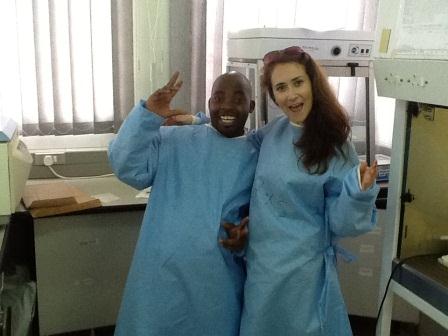
When I was a little kid, I never imagined that someone other than a person who has been trained in medicine can help patients. I grew up thinking that only doctors were entirely responsible for making sure that patients are taken care of.
As time passed I came to realize that I was totally wrong to think along those lines. In fact, I have come realize that patients need support from everyone regardless of the professional one was trained in. Health service delivery in general is facing many challenges that require collective effort in order to address them particularly in resource limited countries. The challenges range from inadequate medical personnel, poor infrastructure, inadequate drugs, corruption, and the list goes.
Since I joined Global Health Corps (GHC) fellowship and placed with Clinton Health Access Initiative in Malawi (CHAI), I have come to understand the deep and enormous challenges facing the delivery of health services to poor people. It sounds very simple and one becomes less concerned when you are a spectator. We need to be players in this game for us to have a clear understand of these challenges.
I have seen so many life frightening situations in health facilities. I have seen patients staying almost the whole day at a clinic without being attended to because the health worker has decided to go and drink beer. I have seen patients being sent back home because the health facility has no drugs. I have seen patients spending days in hospitals because the operating room has no running water for the doctor to use in order to carry out operations. I have seen patients dying without being attended to while nurses are in their rooms cracking jokes. I have seen health workers failing to conduct some basic tests on patients because the computer attached to the machine has develop simple technical problems. I have seen many unbelievable situations. The bottom line of all this is that poor people are really suffering like they are not human beings and urgent attention is needed in order to address these problems. Should we allow people to die because of shortage of running water or a simple technical computer problem? The answer is NO!
All of these challenges and problems are not artificial at all and can be solved if everyone is a player in this game. The provision of health services is like a football game. Every player must do its best for the team to win. Everyone must a take a role to play and play it to the best of their ability. We should not leave the work of addressing these challenges to only health workers. Let’s all use the skills that we have. Whether one is an architect, an IT specialist, plumber, carpenter, builder, brick layer, or police man, let’s join hands and provide high quality health services to the poor.
I never thought that my IT skills could eventually be instrumental in the delivery of health service to the poor. Every day I ensure that all DNA-PCR results have been delivered to health facilities, The Laboratory Information Management System is up and running in the three major central laboratories in Malawi. I now believe that a plumber, a driver, a carpenter, a mechanic, an engineer, a watch man, and in fact every one, has role to play in bringing solutions to these challenges. We really don’t need certificate/degrees in medicine. We just need to be exposed and be committed to play our part in ensuring that all the challenges hindering the delivery of health services to the poor are ironed out. The united we stand, the divided we fall!
